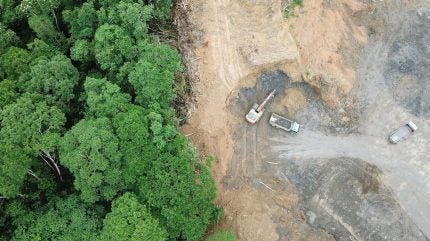
The biggest players in the food and agriculture sectors could lose $150bn in value if they fail to implement no-deforestation/conversion policies, the Carbon Disclosure Project has warned.
In its annual Global Forests Report, the not-for-profit forecast the companies could lose up to 26% of their value by 2030 due to their over-reliance on forests’ resources.

Discover B2B Marketing That Performs
Combine business intelligence and editorial excellence to reach engaged professionals across 36 leading media platforms.
While an increasing number of companies are disclosing the risk to their businesses, only a small number claim to be on track to eradicating deforestation from their supply chains, the CDP said.
The NGO’s report grouped its findings into four “key industries with the highest potential impact on forests” – materials; food, beverage and agriculture; manufacturing; and retail.
In the report, the CDP claimed the food, beverage and agriculture (FBA) industry suffers from “the lowest levels of governance of deforestation” compared to the three other sectors reviewed. While having the second highest proportion of ambitious targets, high levels of traceability, supply chain engagement and involvement in conservation projects, the FBA industry lacks “competent board-level oversight of deforestation”, “public company-wide no-deforestation/conversion policies”, and “comprehensive risk assessments”, the CDP said.
More than 1,000 companies disclosed their progress on managing deforestation through CDP in 2022 – an increase of 300% since 2017, the report said.

US Tariffs are shifting - will you react or anticipate?
Don’t let policy changes catch you off guard. Stay proactive with real-time data and expert analysis.
By GlobalDataHowever, it warns that deforestation could be the “new coal” in financial institutions’ portfolios and will expose over-reliant companies to considerable financial, regulatory and reputational risks.
The report says: “The accelerating climate and nature transition and related incoming policy and demand shifts could mean that 40 of the world’s largest food and agricultural firms worth over $2trn lose up to 26% of their value by 2030, with a sector average hit of over 7%.”
These losses will come from the risk of companies’ over-dependence on natural ecosystems, costly legal action, adverse regulatory changes and consumer activism, the CDP argued.
In a new report, analysis and intelligence group GlobalData, Just Food’s parent, has warned of an increasing shift towards stricter environmental rules, pointing to new regulations in the EU.
The EU’s deforestation law, set to be finalised over the remainder of 2023, will likely come into force in early 2025.
Companies operating in the EU will only be allowed to sell products in the bloc if the supplier of the product has issued a so-called due diligence statement confirming they do not come from deforested land or have led to forest degradation since 31 December 2020.
Companies will also have to verify that their products comply with the relevant legislation of the country of production, including on human rights, and that the rights of affected indigenous people have been respected.
The law covers cattle, cocoa, coffee, palm oil, soya, and wood as well as derivatives of these such as furniture, chocolate and leather.
“As part of their due diligence statement, suppliers must provide the longitude and latitude of the land where the product was sourced. This is on top of the EU’s proposed Corporate Sustainability Due Diligence Directive and EU Forced Labour Regulation, which would require firms to conduct due diligence on their supply chains to check for environmental harms and forced labour,” GlobalData said.
Read more on Just Food: EU’s new law puts industry in spotlight on deforestation




